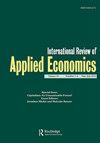垄断市场与气候变化——重温伊迪丝·彭罗斯对气候变化时代国际石油公司的分析
IF 1.6
Q3 ECONOMICS
引用次数: 0
摘要
伊迪丝·彭罗斯(Edith Penrose)对国际石油公司(IOCs)投资的分析源于她对大型国际公司的经济学及其对发展中经济体的影响的兴趣。她的方法强调了影响大公司成长的内生因素,并告诫不要将其视为中立的技术官僚,在那里投资会自动对价格激励做出反应。利用彭罗斯关于石油产品垄断市场的概念,本研究发展了彭罗斯关于动机、利润、自筹资金和国际公司的观点,以解释为什么国际奥委会的制度环境仍然支持对化石燃料的投资。该研究收集了国家和企业层面的投资和生产数据在下游石化炼化。数据显示,垄断市场与大型石油公司扩大炼油能力的战略之间存在联系,这是对限制气候变化的监管政策的战略对冲。这将社会锁定在碳密集型基础设施上,降低了投资动机,增加了全球二氧化碳排放量。研究结果表明,石油公司需要用其留存收益承担更大的绿色投资风险。各国政府需要通过协调一致的监管压力,将这种投资导向对社会有益的目的。文章历史接收日期2022年10月1日接收日期2023年6月15日本文章由计算机程序翻译,如有差异,请以英文原文为准。
Captive markets and climate change: revisiting Edith Penrose’s analysis of the international oil firms in the era of climate change
Edith Penrose’s analysis of the investments of the international oil companies (IOCs) stemmed from her interest in the economics of the large international firm and its implications for developing economies. Her approach highlights the endogenous factors shaping the growth of the large firm and cautions against viewing it as a neutral technocracy where investment automatically responds to price incentives. Drawing on Penrose’s concept of a captive market in oil products, this research develops Penrose’s ideas around motive, profit, self-financing and the international firm to explain why the IOC’s institutional environment still favours investment in fossil fuels. The study collected country and firm level data on investment and production in downstream petrochemical refining. The data show a connection between the captive market and the strategies of the large oil firms in expanding refining capacity as a strategic hedge against regulatory policies to limit climate change. This locks society into a carbon intensive infrastructure, reduces the motivation for investment and adds to global CO2 emissions. The findings indicate that the oil companies need to take greater risks on green investments with their retained earnings. Governments need to direct this investment towards socially useful purposes using coordinated regulatory pressure. ARTICLE HISTORY Received 1 October 2022 Accepted 15 June 2023
求助全文
通过发布文献求助,成功后即可免费获取论文全文。
去求助
来源期刊

International Review of Applied Economics
ECONOMICS-
CiteScore
4.30
自引率
4.50%
发文量
37
期刊介绍:
International Review of Applied Economics is devoted to the practical applications of economic ideas. Applied economics is widely interpreted to embrace empirical work and the application of economics to the evaluation and development of economic policies. The interaction between empirical work and economic policy is an important feature of the journal. The Journal is peer reviewed and international in scope. Articles that draw lessons from the experience of one country for the benefit of others, or that seek to make cross-country comparisons are particularly welcomed. Contributions which discuss policy issues from theoretical positions neglected in other journals are also encouraged.
 求助内容:
求助内容: 应助结果提醒方式:
应助结果提醒方式:


